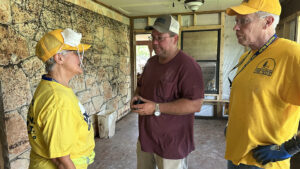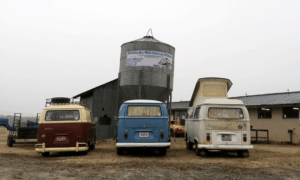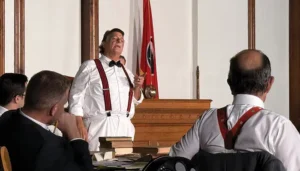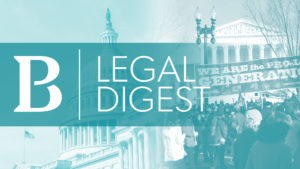
NASHVILLE, Tenn. (BP)–Unfortunately those desperate to grab the camera’s eye politicized the weather itself in the aftermath of Hurricane Katrina, shrieking that whatever went wrong could be traced back to the White House.
Many placed the blame squarely on the president’s back for conditions in the Superdome and the city’s convention center (conditions that were in many cases more rumor than fact), the failure of the levees, and perhaps, even the fact that the hurricane made landfall near New Orleans.
Those looking for a political edge began using the tragedy for political gain — fund-raising. The national chairman of the Democrat Party said we must “come to terms with the ugly truth that skin color, age and economics played a deadly role in who survived and who did not,” implying rescue crews dawdled because those trapped in New Orleans were predominantly black Americans. Others didn’t imply, but made the accusation outright.
Acknowledging the old maxim, “Everybody talks about the weather, but no one can do anything about it,” the situation in New Orleans appears to come down to both probability and (to a large degree) incompetence. Those in charge saw the statistical likelihood of such a hurricane strike as very small, and they opted not to invoke the plans that were in place for such a catastrophe.
This is a national tragedy beyond our normal capacity to grasp. I’ve lived through hurricanes. I went to New Orleans Baptist Theological Seminary the day after Hurricane Camille hit the Mississippi Gulf Coast in 1969, and the destruction was horrendous. I was pastor of Vieux Carré Baptist Church in the heart of the French Quarter for two years. My wife grew up in the Crescent City. The city of New Orleans is near and dear to my heart. The whole time I lived there everyone talked about what would happen if a major storm slammed into the city, but unfortunately, talk was all it was.
Although I love New Orleans, it is the most corrupt city with the most incompetent government of any major city in the United States. The city is located in what has historically been our most politically corrupt state. Douglas Brinkley is a historian and professor at Tulane University in New Orleans. He told FOX News Sept. 29 that New Orleans Mayor Ray Nagin “blundered everything he touched” prior to and since Katrina struck the area.
Brinkley, who is documenting the catastrophe in a book tentatively titled “The Great Deluge,” is the author of “Tour of Duty: John Kerry and the Vietnam War,” and “The Unfinished Presidency: Jimmy Carter’s Journey Beyond the White House,” among other books. His willingness to speak so candidly about what happened in New Orleans indicates the situation is worse than most Americans imagine and made the damage that naturally comes with such a powerful storm as Katrina even more devastating. The city sat on its hands instead of preparing for the eventuality of such a hurricane strike.
The Louisiana and New Orleans’ way, Brinkley said, is to “wink at corruption” and to “tell the people outside of Louisiana: ‘Mind your own business.'”
He told FOX News’ commentator Bill O’Reilly the New Orleans police department (NOPD) needs to be “investigated very thoroughly.” Noting the department has some “great police officers,” Brinkley said as a department, “It failed the people of New Orleans before Katrina, it failed them during it, and it’s failed them after it.”
While crime rates are falling nationwide, the homicide rate in New Orleans is nearly 10 times the national average. In the aftermath of the storm, Americans learned the city’s police department was seriously understaffed — long before the hurricane. In addition, the historically ethically compromised NOPD was not ready for such an emergency. For years the department has faced allegations of brutality and corruption. Two former policemen are facing the death penalty for crimes committed while serving on the police force and more than a dozen others are in prison. In the immediate aftermath of the hurricane, an estimated 250 officers deserted their posts, and some turned looter instead of protector, prompting investigations of police behavior following the storm. According to a FOX News report, a police spokesman dismissed the use of the word, “looting,” using pure New Orleans-speak in admitting instead some officers might be guilty of “the possibility of appropriation of nonessential items during the height of Katrina, from businesses.”
Too few police and inexperienced prosecutors have led to New Orleans citizens’ disinclination to get involved — a fact demonstrated in 2004 when researchers fired off 700 blank rounds in one New Orleans neighborhood in one afternoon and no one called 9-1-1 to report the incident.
Nearly 50 percent of New Orleans public schools have been graded as “academically unacceptable” by the state of Louisiana and another 26 percent are under “academic warning.”
A lot of good people in New Orleans and Louisiana have been badly served by their government, having been victimized by a lack of preparedness and a lack of leadership. A Sept. 17 Los Angeles Times report revealed that even before the hurricane struck the Gulf Coast, officials in Louisiana’s emergency planning agency had been convicted and others were awaiting trial in cases involving the misappropriation of millions of dollars in federal funds intended to prepare the state for storms such as Katrina, including money earmarked for the improvement of the state’s flood control facilities.
Although Howard Dean meant it for ill, he is correct that skin color and economics had much to do with those who have been displaced and who are suffering the most. Poor people (overwhelmingly black in New Orleans) live disproportionately in the lowest part of the city. And this is a city that sits an average six feet below sea level. In its programs, government at all levels has fostered and perpetuated an underclass that was geographically vulnerable at New Orleans’ ground zero.
Nearly one in three residents of New Orleans lives below the national poverty level, and the area has some of the highest homicide and infant-mortality rates in the nation. Many in the city, trapped in poverty and without transportation to higher ground, were victimized yet one more time by a local government that appears to care more for itself than its citizens — a government that promised to take care of their needs and once again broke its promises.
While there has never been a storm like this in New Orleans’ 300-year history, citizens knew that someday the Big One would hit. It has revealed more to the world than we might have wanted shown about urban America. The reconstruction of buildings and infrastructure that will naturally come is not nearly as critical as the reconstruction of personal lives and families that years of poverty and failed government social programs have damaged or destroyed. Those most victimized by the “New Orleans’ way” were the poor and most defenseless.
The answer to disaster — both natural and personal — lies with the body of Christ. The distinctive yellow hats and T-shirts worn by Southern Baptist Disaster Relief volunteers throughout Louisiana and the Gulf Coast and seen often on news reports are witness to the fact that tens of thousands of believers recognize the truth that God has called us to serve our neighbor and honor our Lord in word and deed.
Everybody talks about the weather, but it’s time for the talk to turn to rescuing those locked in the shameful legacy of poverty and government corruption and incompetence. More than the levees failed them in New Orleans.
–30–
Richard Land is president of the Southern Baptist Ethics & Religious Liberty Commission.















